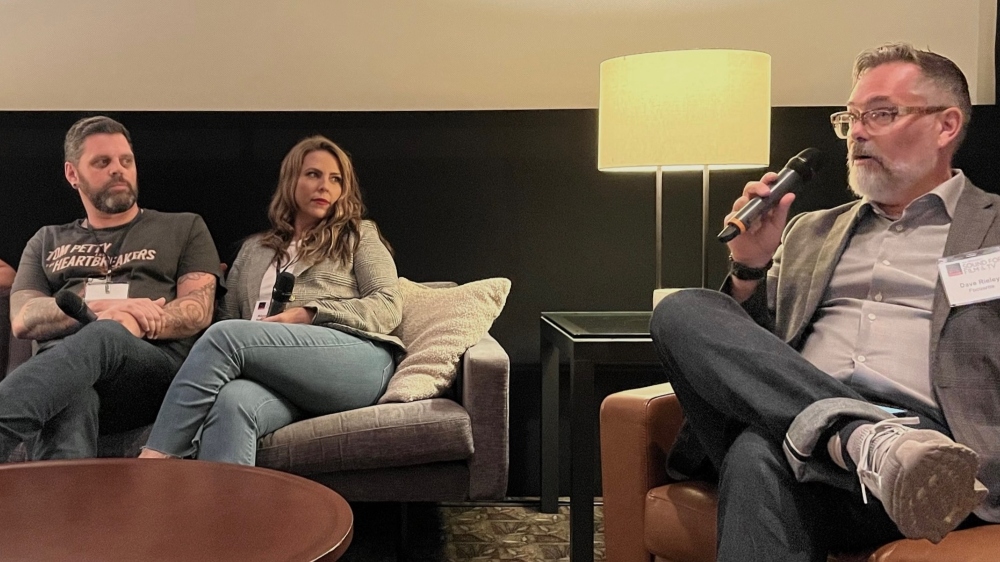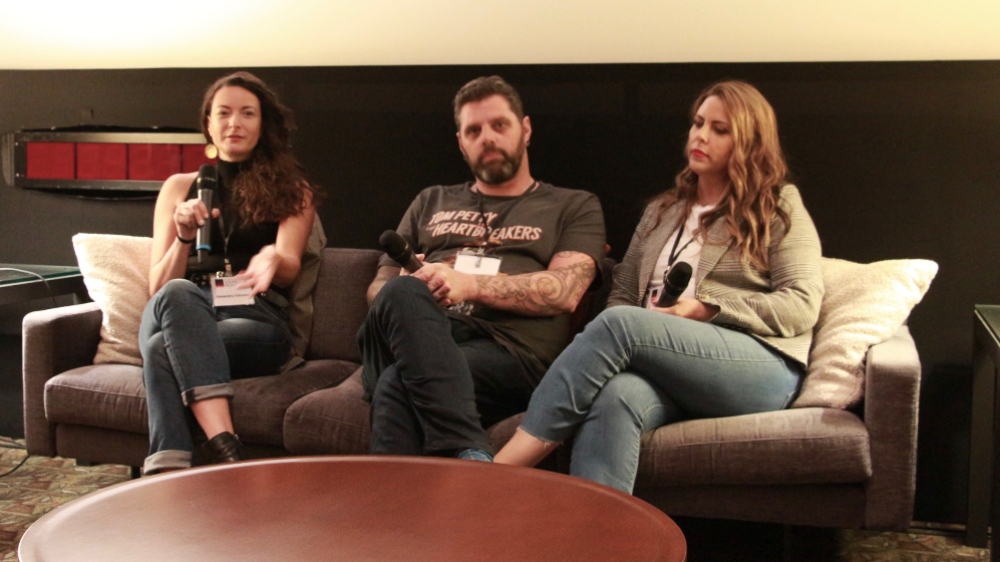
Last week at the Sound for Film & TV event produced by Mix magazine, a panel focused on a growing trend — sound professionals leaving secure jobs at studios and audio facilities to start their own businesses.
Focusrite Group professional director David Rieley, who moderated the panel, pointed out that Netflix’s Post Partner Program was “an early sign of the boom in entertainment.” “With other streaming platforms, a need for post-production services grew,” he said. “More talent has gone out on their own to create their own companies.”
To discuss that trend, the husband-and-wife team of Jeff and Alicia Hannan talked about leaving the security of the job to form Rawr Productions, while freelancer Alexandra Fehrman described how she’s maintained relationships with the studios without being in their direct employ.
The first question Rieley asked was, “what’s changed over the past five years that make indie more appealing?”
Fehrman had a simple answer.
“A lot of clients are working remotely now, so location isn’t as important as it used to be,” she said. “It’s important to have a workflow you can trust that you can offer to your clients.”
Alicia Hannan agreed, adding that, “opening a facility with my husband was a natural progression.” “I came to it with a client’s perspective,” she said. “I watched how clients got tired of the corporate environment and waiting for months to get plug-ins.” “I’ve been sitting in the room for 20 years, seeing talent being compromised, overworked, underpaid, and not passionate about the work,” she continued, noting that she came from an ad agency background. “It’s all about profits and overhead and less about me, the client. We want to nurture the talent and the client and fill the void that’s been rapidly growing over the last 10 years.”
Fehrman’s freelance career works a bit differently. She has a home studio but also contracts directly with studios.
“I very much like working at Sony where I think the culture is great but I also like working at other studios if my client wants to go elsewhere or it’s better for the project,” she said. “Working this way gives me more flexibility to make a choice about each project, its timing and logistics. When you work at one place, you have less autonomy.”

Eventually, Rieley opened the session to questions from the audience. The first came from someone who became an independent and asked about the issue of scaling up an indie business.
“Scaling is a big problem,” said Jeff. “Finding reliable talent is hard.” Rawr Productions has experienced that first-hand, as Alicia added that “Rawr was born out of the pandemic.” “As it wound down, we realized people wanted to come in, so we decided to open up the facility,” she said. “That’s when we went from four shows to 14. Scaling is very complicated at first, but we continue to work with independent contractors rather than have people on staff. If you can find talent who shares your vision on what you’re working on, hang on to them, pay them well and they’ll stick with you so you can continue to build your roster.” Answering a follow-up question as to whether talent could work remotely, Jeff pointed out that, “depending on the content, some content is allowed to leave the facility and some isn’t … so some contractors are remote and some aren’t.”
Another attendee asked Fehrman how she built her business as an independent contractor.
“A lot of my clients who stuck with me the longest didn’t pay me at all in the beginning but now have developed their own careers and have feature films I’m proud to work on,” she said. “I’m not trying to promote the hustle culture. But when I was a tech, I did a lot of ghost mixing, worked after hours. I took anything I could get my hands on to meet producers and cut content on the stage to show them I had the capability to edit. My advice is to show your work to as many people as you can.”
In building an independent business, the Hannans emphasized work habits they developed over the years.
“When I look back on 16-hour days, seven days a week throughout my 20s, 30s, 40s — that was the dedication you need, because 20 guys behind you want it just as bad,” said Jeff. “And you have to be super personable with the clients.”
Alicia added that “a strong work ethic” is required. “Anyone I’ve promoted has come to me and asked what they can do to help,” she said. “If you’re doing an assistant job, and it’s getting coffee and donuts, go get the coffee and donuts with a smile on your face.”
“And be kind to everyone,” added Fehrman. “People move up in the world, so it’s important to get to know people, learn their interests, offer you help.”

Someone then asked the Hannans how much money it takes to get an indie sound business going. Although neither one put a price tag on it, Alicia noted that she “refused to be in debt.” “We saved up for a pool I don’t have,” she said, adding that, “this was a gamble, as is any business starting out.” “We’re lucky we had to scale so fast — but there’s no guarantee that this will continue.”
She also said that both she and Jeff wear many hats; she continues to work for another company while Jeff “is 100 percent with the clients, also fielding phone calls and sending me budgets.” She built the website and started the company’s Instagram feed. “But we do have a great engineer,” she said. “If you want a post house, don’t do it without an engineer.”
Fehrman said that she once hired a publicist when she was nominated for an Emmy. “It was a new experience, and I didn’t know what to do,” she said. “I think it was fun to share my craft and I had more opportunities to be interviewed. Did it help me in a career sense? Probably not, but I would be after that if I did build my own studio.”
To another question, she said that she has the flexibility to negotiate a rate, which can change per project depending on the budget and “how much I want to work on it.” “It took me a long time to get to this place,” she said, “I worked at Todd-AO for nine years and I was happy to be employed by a reputable, well-known company. Now I’m making the same and taking a little bit less work.”
Another attendee asked them all if they worked with contracts. Fehrman replied that bidding on a project and getting picked is like winning an auction. When the indies own a facility — with equipment and staff costs — the cash flow can get crunchy. For that reason, said Alicia, they’ve recently hired an accountant to draw up a contract for large-scale projects.
Based on questions and feedback from the attendees, it appears that “going indie” is a trend that is going to continue, with a range of business models as evidenced by Fehrman and the Hannans.





